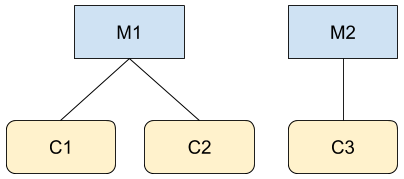Mit der Methode ListAccessibleCustomers in CustomerService können Sie Kunden auflisten, auf die Sie zugreifen können. Es ist jedoch wichtig zu wissen, welche Kunden bei dieser Art von Anfrage zurückgegeben werden.
Das Auflisten zugänglicher Kunden ist eine der wenigen Anfragen in der Google Ads API, für die Sie keine Kundennummer in der Anfrage angeben müssen. Außerdem wird jede angegebene login-customer-id ignoriert.
Die resultierende Kundenliste basiert auf Ihren OAuth-Anmeldedaten. Die Anfrage gibt eine Liste aller Konten zurück, für die Sie mit Ihren aktuellen Anmeldedaten direkt Aktionen ausführen können. Das schließt nicht unbedingt alle Konten in der Kontohierarchie ein, sondern nur Konten, in denen Ihr authentifizierter Nutzer mit Administrator- oder anderen Rechten hinzugefügt wurde.

Angenommen, Sie sind Nutzer A und Administrator für M1 und C3 in den beiden Hierarchien in der Abbildung. Wenn Sie beispielsweise einen Aufruf an die Google Ads API für GoogleAdsService ausführen, können Sie auf Informationen für die Konten M1, C1, C2 und C3 zugreifen. Ein Aufruf von CustomerService.ListAccessibleCustomers würde jedoch nur M1 und C3 zurückgeben, da dies die einzigen Konten sind, auf die Nutzer A direkten Zugriff hat.
Hier ist ein Codebeispiel für die Verwendung der Methode CustomerService.ListAccessibleCustomers:
Java
private void runExample(GoogleAdsClient client) { // Optional: Change credentials to use a different refresh token, to retrieve customers // available for a specific user. // // UserCredentials credentials = // UserCredentials.newBuilder() // .setClientId("INSERT_OAUTH_CLIENT_ID") // .setClientSecret("INSERT_OAUTH_CLIENT_SECRET") // .setRefreshToken("INSERT_REFRESH_TOKEN") // .build(); // // client = client.toBuilder().setCredentials(credentials).build(); try (CustomerServiceClient customerService = client.getLatestVersion().createCustomerServiceClient()) { ListAccessibleCustomersResponse response = customerService.listAccessibleCustomers( ListAccessibleCustomersRequest.newBuilder().build()); System.out.printf("Total results: %d%n", response.getResourceNamesCount()); for (String customerResourceName : response.getResourceNamesList()) { System.out.printf("Customer resource name: %s%n", customerResourceName); } } }
C#
public void Run(GoogleAdsClient client) { // Get the CustomerService. CustomerServiceClient customerService = client.GetService(Services.V22.CustomerService); try { // Retrieve the list of customer resources. string[] customerResourceNames = customerService.ListAccessibleCustomers(); // Display the result. foreach (string customerResourceName in customerResourceNames) { Console.WriteLine( $"Found customer with resource name = '{customerResourceName}'."); } } catch (GoogleAdsException e) { Console.WriteLine("Failure:"); Console.WriteLine($"Message: {e.Message}"); Console.WriteLine($"Failure: {e.Failure}"); Console.WriteLine($"Request ID: {e.RequestId}"); throw; } }
PHP
public static function runExample(GoogleAdsClient $googleAdsClient) { $customerServiceClient = $googleAdsClient->getCustomerServiceClient(); // Issues a request for listing all accessible customers. $accessibleCustomers = $customerServiceClient->listAccessibleCustomers(new ListAccessibleCustomersRequest()); print 'Total results: ' . count($accessibleCustomers->getResourceNames()) . PHP_EOL; // Iterates over all accessible customers' resource names and prints them. foreach ($accessibleCustomers->getResourceNames() as $resourceName) { /** @var string $resourceName */ printf("Customer resource name: '%s'%s", $resourceName, PHP_EOL); } }
Python
def main(client: GoogleAdsClient) -> None: customer_service: CustomerServiceClient = client.get_service( "CustomerService" ) accessible_customers: ListAccessibleCustomersResponse = ( customer_service.list_accessible_customers() ) result_total: int = len(accessible_customers.resource_names) print(f"Total results: {result_total}") resource_names: List[str] = accessible_customers.resource_names for resource_name in resource_names: # resource_name is implicitly str print(f'Customer resource name: "{resource_name}"')
Ruby
def list_accessible_customers() # GoogleAdsClient will read a config file from # ENV['HOME']/google_ads_config.rb when called without parameters client = Google::Ads::GoogleAds::GoogleAdsClient.new accessible_customers = client.service.customer.list_accessible_customers().resource_names accessible_customers.each do |resource_name| puts "Customer resource name: #{resource_name}" end end
Perl
sub list_accessible_customers { my ($api_client) = @_; my $list_accessible_customers_response = $api_client->CustomerService()->list_accessible_customers(); printf "Total results: %d.\n", scalar @{$list_accessible_customers_response->{resourceNames}}; foreach my $resource_name (@{$list_accessible_customers_response->{resourceNames}}) { printf "Customer resource name: '%s'.\n", $resource_name; } return 1; }
curl
# Returns the resource names of customers directly accessible by the user # authenticating the call. # # Variables: # API_VERSION, # DEVELOPER_TOKEN, # OAUTH2_ACCESS_TOKEN: # See https://developers.google.com/google-ads/api/rest/auth#request_headers # for details. # curl -f --request GET \ "https://googleads.googleapis.com/v${API_VERSION}/customers:listAccessibleCustomers" \ --header "Content-Type: application/json" \ --header "developer-token: ${DEVELOPER_TOKEN}" \ --header "Authorization: Bearer ${OAUTH2_ACCESS_TOKEN}" \
Aufgelöste Konten auflisten
Über die Google Ads API gibt es keine direkte Möglichkeit, die gekündigten Konten unter einem Verwaltungskonto aufzulisten. Sie können diese Liste jedoch mit dem folgenden Workaround abrufen.
Rufen Sie die Liste der
ACTIVE-Links mit dercustomer_client_link-Ressource ab und erstellen Sie eine Liste der Kunden mit dem Feldcustomer_client_link.client_customer.SELECT customer_client_link.client_customer, customer_client_link.status FROM customer_client_link WHERE customer_client_link.status = ACTIVERufen Sie die Liste der
ENABLED-Konten mit dercustomer_client-Ressource ab.SELECT customer_client.id, customer_client.descriptive_name FROM customer_clientDie Differenz zwischen den beiden Listen ergibt die Liste der gekündigten Konten.

